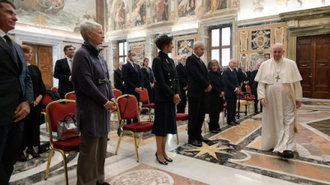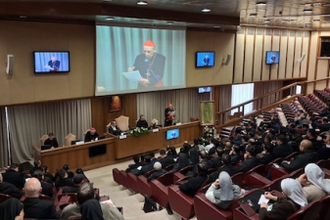Pope Francis: Care of patients comes before profit

Campus Bio-Medico University Hospital staff meet Pope Francis. Image Vatican Media
Source: Vatican News
Pope Francis on Monday told a delegation of staff from a Catholic hospital in Rome that there are no lives unworthy to be discarded, and healthcare must not be prey to the demands of profit.
"Every health care facility, especially those of Christian inspiration, should be a place where care for the person is practiced and where it can be said: 'Here you do not see only doctors and patients, but people who welcome and help each other: here you can experience the therapy of human dignity'." he said to the group from Campus Bio-Medico University Hospital.
Founded in 1993, the Catholic institution was inspired by Blessed Alvaro del Portillo, a Spanish bishop of the Opus Dei prelature. The Pope noted that Blessed del Portillo had encouraged them to put the patient before the disease, which, he said, is essential in every field of medicine and is fundamental for a treatment that is truly comprehensive and human.
Pope Francis also stressed the importance of science and research in medicine, saying: "care without science is vain, just as science without care is sterile". Science and research together, he said, make medicine an art, that involves the head and heart, combining knowledge and compassion, professionalism and pity, competence and empathy.
He thanked the Campus Bio-Medico University Hospital delegation for favouring a humane development of research. He lamented the temptation to profit over the needs of the sick and the elderly in healthcare - needs which are constantly evolving with new diseases and inconveniences.
He commended the Campus for helping those who do not have the financial means to meet university expenses. He also mentioned its efforts such as the Covid Center, the Emergency Room, and the Hospice.
The Holy Father emphasised that all these efforts must be done together, saying the pandemic has underscored the importance of connecting, collaborating and addressing common problems together. Catholic healthcare particularly needs to network. "Charity requires a gift: knowledge must be shared, competence must be shared, science must be shared," he said.
Offering science and its products alone, he warned, will remain just plasters plugging the evil but not helping cure it in depth. This is true, for example, with vaccines, he said, adding, it is urgent to help countries that have less, but it must be done with farsighted plans and should not be motivated only by the haste of wealthy nations to be safer. "Remedies must be distributed with dignity, not as pitiful handouts."
Pope Francis concluded, encouraging the Campus Bio-Medico University Hospital to continue on this path and be open to the inspirations and surprises of the Holy Spirit in its encounter with situations that require closeness and compassion.
Last Thursday the Pope met Italian pharmacists meeting in Rome for their annual conference. He urged them to watch out against the culture of waste and maintain ethical principles in their profession, reiterating that abortion is murder.
He underscored the importance of the national public health system in ensuring the common good and social growth of a country, especially in the context of the pandemic, which is changing the organisation and management of health and healthcare.
The Pope held out the figure of the innkeeper in the parable of the Good Samaritan, saying he reflects the daily routine and the hidden service of the hospital pharmacists. Requiring patience, constancy, and precision, amid little visibility, pharmacists can generate the "holiness of everyday life" by prayer and love.
He added, the hospital pharmacist comes in immediate contact with patients; sometimes the pharmacy is invisible but makes everything work, ensuring the person is the recipient of care.
The third path, Pope Francis said, is the ethical dimension at the personal and social levels. On the personal ethical level, he reminded hospital pharmacists: "You are always at the service of human life." This he said, "may involve conscientious objection, which is not disloyalty, but on the contrary fidelity to your profession, if validly motivated".
Noting a trend to do away with conscientious objection, the Holy Father said it is an ethical principle and the ultimate responsibility of every health professional which cannot be negotiated.
Conscientious objection, the Pope continued is also a denunciation of injustices against innocent and defenceless life. In this regard, the Pontiff raised the issue of abortion. "You know that I am very clear about this: it is murder and it is not licit to become its accomplice," he stressed. Rather, he said, it is our duty to be close to situations, especially to women, so that they don't regard abortion as a solution, because in reality, it is not the solution.
On the social justice level, Pope Francis said that the pursuit of justice and the common good must be economically and ethically sustainable. As the Italian National Health Service seeks to provide universal access to healthcare, the management and financial criteria should not be the sole norms. "The culture of waste must not affect your profession," he said. He deplored the fact that elderly men and women are given half their medicine requirements to shorten their lives, saying, this too is waste.
The management of resources must not be only an economic issue but also an ethical and human one. Everyone is called upon to obey the "ethical protocol" in science and conscience, the Pope added.


















